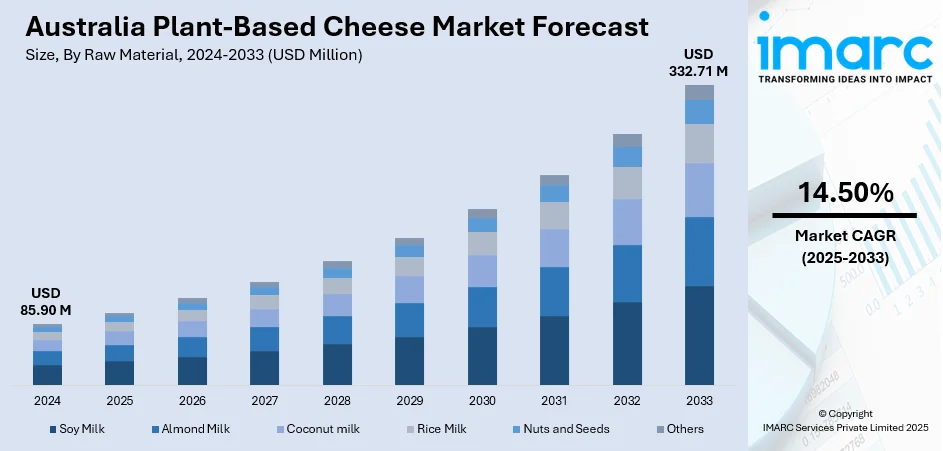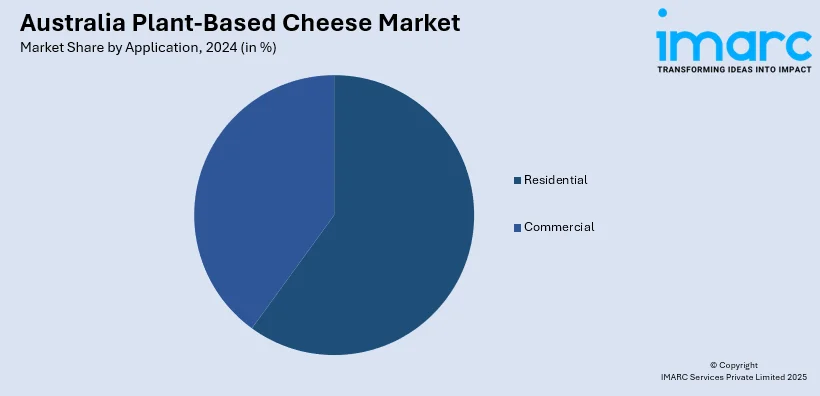
Australia Plant-Based Cheese Market Size, Share, Trends and Forecast by Raw Material, Product Type, Application, Distribution Channel, and Region, 2025-2033
Australia Plant-Based Cheese Market Size and Share:
The Australia plant-based cheese market size reached USD 85.90 Million in 2024. Looking forward, IMARC Group expects the market to reach USD 332.71 Million by 2033, exhibiting a growth rate (CAGR) of 14.50% during 2025-2033. The market is driven by rising veganism, increasing awareness regarding lactose intolerance, and rising demand for sustainable food options. Innovations in taste and texture are also attracting health-conscious consumers to consume plant-based cheese. Supermarkets and specialty stores are expanding their vegan offerings, enhancing product accessibility and visibility. These trends are shaping the evolving competitive landscape of the Australia plant-based cheese market share.
|
Report Attribute
|
Key Statistics
|
|---|---|
|
Base Year
|
2024
|
|
Forecast Years
|
2025-2033
|
|
Historical Years
|
2019-2024
|
| Market Size in 2024 | USD 85.90 Million |
| Market Forecast in 2033 | USD 332.71 Million |
| Market Growth Rate 2025-2033 | 14.50% |
Australia Plant-Based Cheese Market Trends:
Rising Veganism, Vegetarianism, and Flexitarian Lifestyles
There has been a significant increase in plant‑based dietary patterns across Australia. More consumers are choosing vegan or vegetarian diets, or adopting flexitarian lifestyles, motivated by ethical beliefs, animal welfare concerns, and cultural shifts toward plant‑first eating. This has fueled demand for high‑quality dairy alternatives that align with their values. In turn, producers are expanding their offerings to cater to these evolving preferences, introducing a wide variety of plant‑based cheeses that replicate traditional dairy in taste and appearance. As the number of flexitarian households grows, plant‑based cheese has found a stable consumer base. This trend continues to reinforce product innovation and market entry, securing a stronger foothold for non‑dairy options across retail channels.

To get more information on this market, Request Sample
Health and Lactose Intolerance Awareness
Awareness of lactose intolerance and the broader health benefits of reducing dairy consumption plays a central role in the Australia plant‑based cheese market growth. Many Australians are seeking dairy substitutes to avoid digestive discomfort and reduce saturated fat intake. Vegan cheese often offers no cholesterol, lower saturated fat, and can be fortified with nutrients like B‑complex vitamins, making it a healthier alternative for those managing dietary requirements. This health‑driven consumer behavior encourages food manufacturers to develop better‑for‑you products, targeting both allergy sufferers and those pursuing wellness lifestyles. As a result, retailers are increasingly highlighting plant‑based cheese on health‑conscious aisles, reinforcing its appeal to consumers seeking functional, digestible, and nutrient‑smart options.
Technological Innovation and Regulatory Support
Innovation in food technology, such as new formulations, fermentation methods, and the use of non-animal rennet, underpins the evolving plant‑based cheese market. Expanding product diversity (like mozzarella, cheddar, cream cheese, parmesan, etc.) has made vegan cheese more accessible and appealing to mainstream consumers. Additionally, advances in precision fermentation—where companies produce real milk proteins via microbial processes—are helping replicate the texture and flavor that previously limited plant‑based cheese adoption. Regulatory frameworks and government grants, such as those from Food Standards Australia New Zealand (FSANZ), also promote innovation, ensuring quality, safety, and supporting research and development (R&D). These factors collectively accelerate market maturation and consumer confidence in these emerging products.
Australia Plant-Based Cheese Market Segmentation:
IMARC Group provides an analysis of the key trends in each segment of the market, along with forecasts at the country and regional levels for 2025-2033. Our report has categorized the market based on raw material, product type, application, and distribution channel.
Raw Material Insights:
- Soy Milk
- Almond Milk
- Coconut milk
- Rice Milk
- Nuts and Seeds
- Others
The report has provided a detailed breakup and analysis of the market based on the raw material. This includes soy milk, almond milk, coconut milk, rice milk, nuts and seeds, and others.
Product Type Insights:
- Mozzarella
- Parmesan
- Cheddar
- Others
A detailed breakup and analysis of the market based on the product type have also been provided in the report. This includes mozzarella, parmesan, cheddar, and others.
Application Insights:

- Residential
- Commercial
A detailed breakup and analysis of the market based on the application have also been provided in the report. This includes residential and commercial.
Distribution Channel Insights:
- Offline Stores
- Online Stores
A detailed breakup and analysis of the market based on the distribution channel have also been provided in the report. This includes offline stores and online stores.
Regional Insights:
- Australia Capital Territory & New South Wales
- Victoria & Tasmania
- Queensland
- Northern Territory & Southern Australia
- Western Australia
The report has also provided a comprehensive analysis of all the major regional markets, which include the Australia Capital Territory & New South Wales, Victoria & Tasmania, Queensland, Northern Territory & Southern Australia, and Western Australia.
Competitive Landscape:
The market research report has also provided a comprehensive analysis of the competitive landscape. Competitive analysis such as market structure, key player positioning, top winning strategies, competitive dashboard, and company evaluation quadrant has been covered in the report. Also, detailed profiles of all major companies have been provided.
Australia Plant-Based Cheese Market News:
- In March 2023, Bega Cheese, the Australian dairy company, launched its inaugural plant-based cheese substitute. The firm obtained placements at Coles, the second-largest supermarket in Australia. Bega Cheese stated that the items, produced at its facility in Strathmerton, Victoria, are offered in sliced and shredded forms.
Australia Plant-Based Cheese Market Report Coverage:
| Report Features | Details |
|---|---|
| Base Year of the Analysis | 2024 |
| Historical Period | 2019-2024 |
| Forecast Period | 2025-2033 |
| Units | Million USD |
| Scope of the Report |
Exploration of Historical Trends and Market Outlook, Industry Catalysts and Challenges, Segment-Wise Historical and Future Market Assessment:
|
| Raw Materials Covered | Soy Milk, Almond Milk, Coconut Milk, Rice Milk, Nuts and Seeds, Others |
| Product Types Covered | Mozzarella, Parmesan, Cheddar, Others |
| Applications Covered | Residential, Commercial |
| Distribution Channels Covered | Offline Stores, Online Stores |
| Regions Covered | Australia Capital Territory & New South Wales, Victoria & Tasmania, Queensland, Northern Territory & Southern Australia, Western Australia |
| Customization Scope | 10% Free Customization |
| Post-Sale Analyst Support | 10-12 Weeks |
| Delivery Format | PDF and Excel through Email (We can also provide the editable version of the report in PPT/Word format on special request) |
Key Questions Answered in This Report:
- How has the Australia plant-based cheese market performed so far and how will it perform in the coming years?
- What is the breakup of the Australia plant-based cheese market on the basis of raw material?
- What is the breakup of the Australia plant-based cheese market on the basis of product type?
- What is the breakup of the Australia plant-based cheese market on the basis of application?
- What is the breakup of the Australia plant-based cheese market on the basis of distribution channel?
- What is the breakup of the Australia plant-based cheese market on the basis of region?
- What are the various stages in the value chain of the Australia plant-based cheese market?
- What are the key driving factors and challenges in the Australia plant-based cheese market?
- What is the structure of the Australia plant-based cheese market and who are the key players?
- What is the degree of competition in the Australia plant-based cheese market?
Key Benefits for Stakeholders:
- IMARC’s industry report offers a comprehensive quantitative analysis of various market segments, historical and current market trends, market forecasts, and dynamics of the Australia plant-based cheese market from 2019-2033.
- The research report provides the latest information on the market drivers, challenges, and opportunities in the Australia plant-based cheese market.
- Porter's five forces analysis assist stakeholders in assessing the impact of new entrants, competitive rivalry, supplier power, buyer power, and the threat of substitution. It helps stakeholders to analyze the level of competition within the Australia plant-based cheese industry and its attractiveness.
- Competitive landscape allows stakeholders to understand their competitive environment and provides an insight into the current positions of key players in the market.
Need more help?
- Speak to our experienced analysts for insights on the current market scenarios.
- Include additional segments and countries to customize the report as per your requirement.
- Gain an unparalleled competitive advantage in your domain by understanding how to utilize the report and positively impacting your operations and revenue.
- For further assistance, please connect with our analysts.
 Request Customization
Request Customization
 Speak to an Analyst
Speak to an Analyst
 Request Brochure
Request Brochure
 Inquire Before Buying
Inquire Before Buying




.webp)




.webp)












